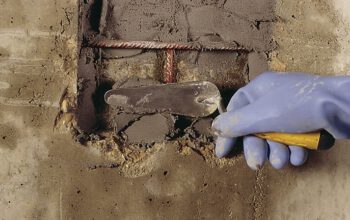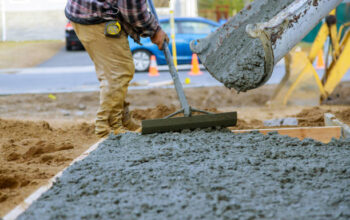 Concrete countertops have come a long way since their humble start as a temporary remedy for construction and other onsite repairs. While concrete may seem a simple material to work with, it has many unique qualities that set it apart from different materials such as marble or granite. For example, concrete countertops retain their excellent surface even when they are standing in the heat of an oven. That is because concrete’s natural viscosity is maintained by an external water vapor barrier that effectively cools the surface. Unlike marble or granite, concrete does not crack, chip or break, and can be easily cleaned with soap and water. For more information, Visit Website.
Concrete countertops have come a long way since their humble start as a temporary remedy for construction and other onsite repairs. While concrete may seem a simple material to work with, it has many unique qualities that set it apart from different materials such as marble or granite. For example, concrete countertops retain their excellent surface even when they are standing in the heat of an oven. That is because concrete’s natural viscosity is maintained by an external water vapor barrier that effectively cools the surface. Unlike marble or granite, concrete does not crack, chip or break, and can be easily cleaned with soap and water. For more information, Visit Website.
Although concrete countertops and other installations made of this material can be pretty costly to install, the initial cost is well worth the benefits long-term. Because concrete resists staining from liquids, it is often used as a countertop in high-traffic areas such as kitchen and bathroom vanities, walk-in refrigerators, and even home offices. Concrete is also preferred because it is strong enough to resist high pressure, is scratch and stain-resistant, and can be formed into custom-designed patterns and cuts to fit a given need. Concrete molds and manufacturers can produce a wide range of countertop designs that can be custom-fit to meet different specifications.
When concrete countertops were initially created, molds were made of a basic round shape. Over time, mold designers discovered that cast concrete molds could also be formed into complex geometric patterns, including squares, rectangles, triangles, and others. Today, there are a wide range of concrete molds to create complex, artistic designs ranging from stylized to realistic. Most custom concrete molds are acrylic, because they do not contain any wood dust, and concrete artists can create intricate designs with ease.
Another benefit of concrete countertops and other installations made of this material is that the material does not require any grouting. Wood-based grouting is quite messy and can lead to discoloration, stains, or splintering if not properly installed. Granite, on the other hand, can easily be stained, polished, or discolored by simply applying a topical cleaning product. Granite is also highly resistant to scratching, and will not be damaged by hot pans or pots. Concrete has very low maintenance costs and can last for decades without needing to be repaired or refinished.
With all of these benefits, it is no wonder that concrete countertops and other installations are becoming more popular every day. In addition to the variety of design patterns available, another benefit of concrete is the fact that it is one of the most inexpensive countertop options available. Unlike granite, for example, concrete countertops do not require the same initial investment. In addition, when compared to the price of granite, concrete is actually cheaper. Concrete also has the ability to be custom-made, which will allow homeowners to incorporate their own unique design ideas into their finished basement area.
The process of installing concrete counters involves several steps. First, the concrete must be poured into molds to form the countertop imprint. Next, the concrete must be cured in place for the best possible appearance. Finally, once concrete cures, it must be carefully installed by professional carpenters so that it does not crack, chip, or become stained. While some people are concerned about the appearance of concrete counters, there is little to worry about when it comes to the health of those who will be using it.
When it comes to convenience, concrete counters offer many benefits. Unlike granite or other materials that must be installed with an extensive amount of work, concrete countertops can be installed quickly and easily. This means that there is no need to have a basement full of tools just waiting to come in handy. Many homeowners are also able to enjoy the beauty of concrete countertops without worrying about them being too cold or hard to clean. As previously mentioned, concrete countertops require very little maintenance, which is another positive when considering the benefits that they offer.
While concrete countertops may offer a few cons in the area of appearance, in general they are a great choice. They are extremely durable, they are very easy to clean, and they are very inexpensive. For these reasons, concrete countertops have become quite popular in recent years. They provide a great alternative to materials such as granite or ceramic tile that are far more expensive and which require more maintenance. Of course, just because concrete countertops are a popular choice does not mean that they are perfect. There are always certain areas of countertop installation that require special attention to ensure that they are done correctly and that they look great when they are installed.



